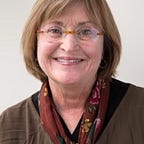The Evolution of Ecological Ethics
The Evolution of Ecological Ethics
“The universe is not a collection of objects. It is a communion of subjects”
— Thomas Berry
Western Washington University Honors Seminar, Fall 2029
Instructor: Joan Connell
From the beginning of human history, storytelling has been central to our understanding of ourselves and our place in the universe. In every culture, sacred narratives tell the story of human origins, providing insights into who we are, why we exist, where we’re headed.
Science also has stories to tell. The most ancient narratives of the material world are written in the soils and sand, rocks and waters of our planetary home. Scientific narratives of evolution, of the beauty and symmetries of mathematics, of physics, biology, and astronomy are part of the human story. Their can be glimpsed through the lenses of research microscopes, in the orbits of the planets, and in the movements of the stars.
This seminar explores how narratives from religion and science can contribute to the slow but steady dawning of an ecological awareness. It asks three key questions:
- What are human’s ethical obligations to each other and to the species with whom we share our endangered planet?
- How does religion — for good or ill — function as a reservoir of values to guide our ethical choices on how we treat the Earth and each other ?
- How can science help us understand the story of our true origins and our collective destiny as the dominant species on an endangered planet in an evolving universe?
The goal of this seminar is to explore the literary and theological dimensions of sacred literature from a variety of religious traditions. We will also explore evolution as a material, intellectual and spiritual process, a master narrative that could guide our actions in the unfolding Ecological Era.
People often feel powerless and overwhelmed by the problems of the world and the enormity of climate crisis. By acquainting students with the work of a diverse array of contemporary theologians, ethicists, scientists and cultural historians — this class offers an antidote to the apocalyptic narratives that permeate our public conversation on climate and provide reason to hope that humankind can heal its broken relationship with nature.
Course Goals and Objectives
- Explore creation/salvation narratives of indigenous peoples, the Judeo-Christian tradition, Asian religious traditions and African-American eco-womanist theology. These stories help us understand how religion can serve as a reservoir of values — for good or for ill — that guide human interactions with nature and with our quest for .
- Explore science’s story of evolution. This provides a larger frame for climate crisis and the ethical obligations humans have to the species with whom we share the planet. When frames enlarge, the possibility exists for meaningful change.
- Experience nature. Through the immersive practice of shinrin-yoku, a secular, eco-spiritual exercise grounded in the principles of Japan’s Shinto tradition.
Readings, study questions and weekly book reports (300 points/50 percent)
- Text: Dream of the Earth: Selected readings and study questions from cultural historian Thomas Berry’s landmark book on religion and ecology. Berry’s work serves as a compass and a beacon illuminating the evolving ethics of the ecological era. (150 points)
- Readings on Religion, Ethics and Nature : Weekly readings and study questions on creation/salvation narratives, cosmological theology, earth justice and activism. (150 points)
Collaborations and Creative Projects
There are no quizzes or research papers in this seminar. It’s all about intellectual and nature experiences, group reflection and creative collaborations among students online and in the virtual classroom.
- Immersion in nature: Students individually explore the Japanese practice of shinrin-yoku, or forest bathing,” a weekly exercise in eco-spirituality, grounded in Japan’s Shinto traditions. Detached from digital technology, in solitary ventures into a forest setting, forest bathing invites us to a sensory immersion in a forest setting, bridging the gap between us and the natural world. (100 points)
- Book Buddy Collaboration : Each student chooses a book to read from the Religion/Ethics/Nature bookshelf and chooses a buddy with whom to share insights on what their reading. Each Book Buddy team shares their learnings in class reports drawn from the Religion, Ethics and Nature Bookshelf (100 points)
- Evolution: A Journal for the Ecological Era (300 points)
- Using text, images, videos, audio and insights from seminar discussions, teams of students collaborate to create weekly reflections on what we have collectively read, discussed and experienced in nature and in the online classroom.
- These reflections create a living document — actually, a giant Google slide deck — that takes shape over 10 weeks of this seminar. It’s an open-ended opportunity to track the evolution of your own ideas about ecological ethics grounded in cultural history, religion, nature, science — and anything else we discover along the way.
